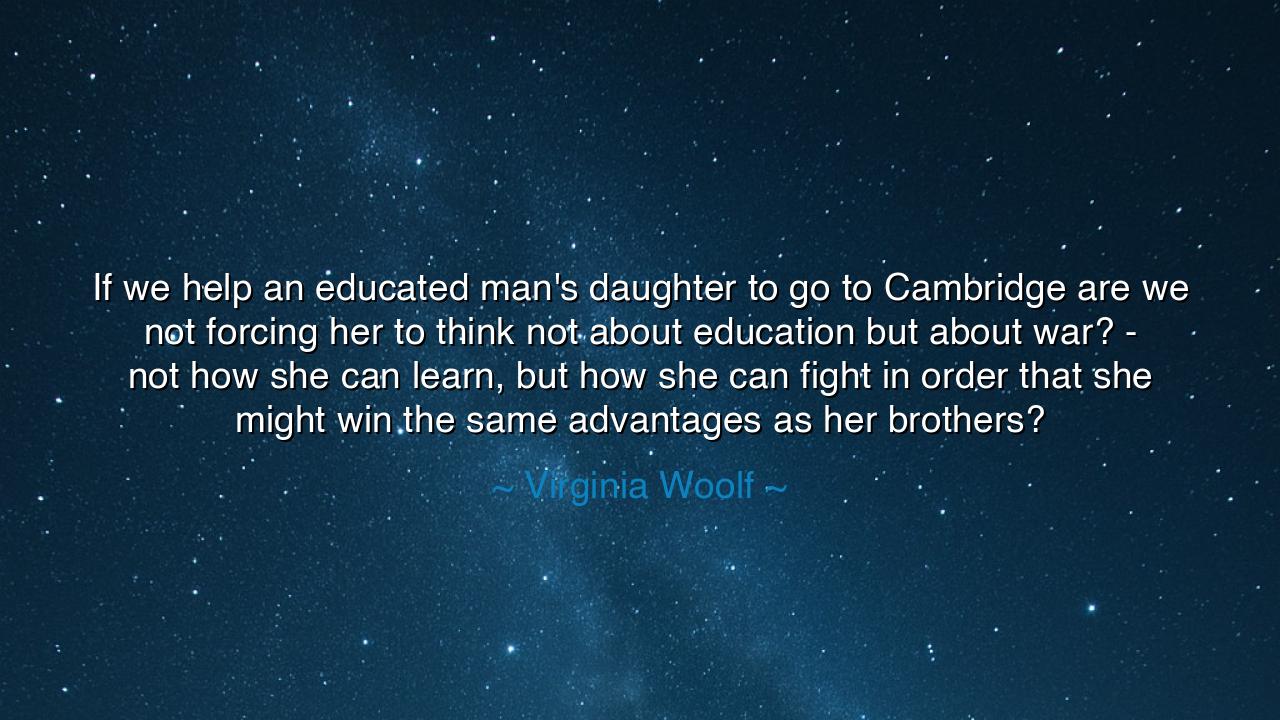
If we help an educated man's daughter to go to Cambridge are we
If we help an educated man's daughter to go to Cambridge are we not forcing her to think not about education but about war? - not how she can learn, but how she can fight in order that she might win the same advantages as her brothers?






The luminous and daring voice of Virginia Woolf, that seer of the soul’s unspoken wars, once asked: “If we help an educated man’s daughter to go to Cambridge, are we not forcing her to think not about education but about war?—not how she can learn, but how she can fight in order that she might win the same advantages as her brothers?” In this question lies the ache of generations—the cry of a woman who saw how the gates of learning, long barred against women, opened only through struggle. Woolf does not speak here in bitterness, but in sorrowful wisdom. She asks not only why women must fight for their place in the halls of learning, but also what becomes of the spirit of education when the path to it is paved with combat.
To understand her words, one must return to the age in which she lived. The early 20th century was a time of awakening, yet also of exclusion. The great universities of England, like Cambridge and Oxford, were temples of intellect—but their doors were guarded by tradition, a tradition that proclaimed that the sons of men were meant to think, while the daughters were meant to serve. Woolf, in her essay Three Guineas, looked upon this injustice not with rage alone, but with the piercing gaze of a philosopher. She asked whether helping women to enter those institutions merely taught them to imitate the masculine pursuit of dominance, to join the old battles rather than to transform the spirit of learning itself.
She saw that when a woman is told she must fight to be equal, she begins to learn the ways of war, not the ways of peace. She learns ambition, rivalry, conquest—the very qualities that had poisoned the world and led to bloodshed. And so Woolf, in her infinite subtlety, posed the deeper question: what is the purpose of education? Is it merely to gain the same power that others wield? Or is it to create a new vision of thought, gentler, freer, untouched by the lust for victory? Her words are a lament for a world that teaches women to fight for knowledge rather than to dwell in it with joy. For true learning, she believed, must be born of curiosity, not competition; of creation, not conquest.
We may see a mirror of Woolf’s thought in the life of Malala Yousafzai, who, a century later, stood against the same tyranny in a different form. Denied the right to learn, threatened by those who feared an educated girl, she risked her life to claim it. Yet even in her courage, she spoke not of vengeance, but of peace. “One child, one teacher, one book, one pen can change the world,” she said. She did not seek education as a weapon, but as a light. In her, the spirit of Woolf’s question finds its answer: the struggle may begin in war, but the end must be peace—the transformation of learning into liberation, not domination.
Woolf’s words also challenge the very foundations of what we call progress. If education becomes a battlefield—if every student must fight for their place, for recognition, for worth—then it ceases to be education at all. It becomes an armory, a place where the soul learns defense rather than discovery. The tragedy Woolf saw was not that women lacked intelligence, but that society, in demanding they prove it, taught them to measure themselves by the same violent standards that had enslaved men. She yearned for a world where knowledge could be pursued for its own sake, where learning was not a contest but a communion.
In her metaphor of war, Woolf speaks beyond gender. For even today, many are forced to battle for the right to learn—by poverty, by prejudice, by the weight of systems that value conformity over creativity. The true aim of education, she would remind us, is not to climb higher than another, but to awaken the divine within oneself. The mind should not be armed, but opened. The scholar’s triumph is not in conquest, but in compassion; not in victory, but in vision.
Thus, the lesson of her words is both timeless and urgent. Do not make learning a battlefield. Do not teach the young to fight merely to earn a place at the table; teach them to build new tables where all may sit. Help others to learn, not so they may win advantages, but so they may understand themselves and the world. Let education be an act of healing, not rivalry; an offering of peace, not an inheritance of war.
So let us remember Virginia Woolf, who wrote with the fire of insight and the tenderness of truth. She calls to us across the years: that the highest education is not the conquest of knowledge, but the harmony of wisdom and soul. Let us therefore build schools and societies where no one must fight to learn, but where all may learn to end the fight. For when the war for equality becomes a communion of minds, then—and only then—shall humanity itself be educated.






AAdministratorAdministrator
Welcome, honored guests. Please leave a comment, we will respond soon